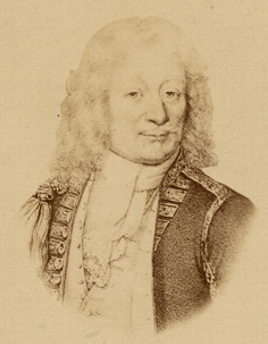Michel-Ange Duquesne de Menneville
Marquis Duquesne redirects here. For the French naval officer, marquis du Bouchet, see Abraham Duquesne
| Michel-Ange Duquesne de Menneville | |
|---|---|
 | |
| Born |
4 April 1700 Toulon, France |
| Died |
17 September 1778 (aged 78) Antony, Hauts-de-Seine, France |
| Occupation | Governor of New France |
Michel-Ange Du Quesne de Menneville, Marquis Du Quesne (c. 1700 – 17 September 1778) was a French Governor General of New France. He was born in Toulon.
Du Quesne served from 1752 through 1755, and is best known for his role in the French and Indian War. Fort Duquesne, established in 1755 at the confluence of the Allegheny and Monongahela Rivers at what is now Pittsburgh, Pennsylvania, was named for him. It was abandoned by French forces in 1758 with the arrival of the much more powerful British Forbes Expedition, who erected Fort Pitt in its place.
He was very aggressive in enforcing French claims in North America, by some accounts even clearing out British settlers out of disputed areas. He built a line of defensive fortifications to strengthen the French presence. He later returned to France.
Battle of Cartagena
In 1758 he led a French squadron out of Toulon, intended to relieve another French squadron which had been sailing to Louisbourg to provide relief to the defenders there, but had been forced into Cartagena in neutral Spain. However, Du Quesne was attacked by a British force led by Henry Osborne and two of his ships were captured, including his own flagship. The ultimate result of this action was to deny Louisbourg any chance of relief, and it surrendered later in the year.
He died in 1778 in Antony, Hauts-de-Seine.
Duquesne University was named after him.
External links
| Government offices | ||
|---|---|---|
| Preceded by Marquis de La Jonquière |
Governor General of New France 1752–1755 |
Succeeded by Pierre François de Rigaud, Marquis de Vaudreuil-Cavagnal |